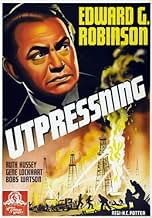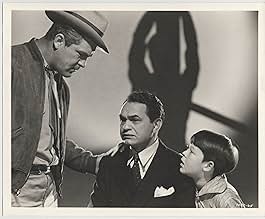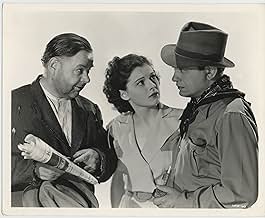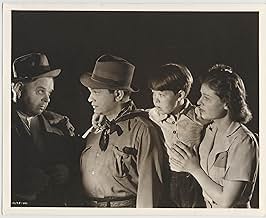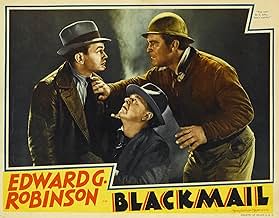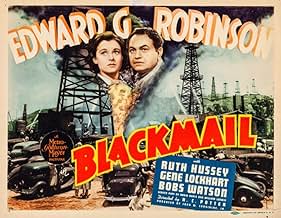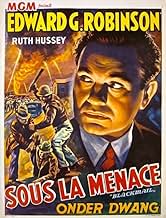VALUTAZIONE IMDb
6,7/10
879
LA TUA VALUTAZIONE
Aggiungi una trama nella tua linguaJohn Ingram, successful oil field firefighter, is really a chain gang escapee. Someone out of his past finds him.John Ingram, successful oil field firefighter, is really a chain gang escapee. Someone out of his past finds him.John Ingram, successful oil field firefighter, is really a chain gang escapee. Someone out of his past finds him.
- Regia
- Sceneggiatura
- Star
Guinn 'Big Boy' Williams
- Moose McCarthy
- (as Guinn Williams)
Lew Harvey
- Workman
- (scene tagliate)
Mitchell Lewis
- Workman
- (scene tagliate)
Ted Oliver
- Workman
- (scene tagliate)
Lee Phelps
- Guard
- (scene tagliate)
Trevor Bardette
- Southern Deputy
- (non citato nei titoli originali)
Willie Best
- Bunny - the Janitor
- (non citato nei titoli originali)
Stanley Blystone
- Oil Worker
- (non citato nei titoli originali)
Wade Boteler
- Police Sergeant
- (non citato nei titoli originali)
Ed Brady
- Prisoner Worrying About Dick Tracy
- (non citato nei titoli originali)
Recensioni in evidenza
Back in the mid-1930s, Warner Brothers came out with a shockingly brutal and absorbing drama about the evils of chain gangs. Paul Muni's performance and the script for "I Was a Fugitive From a Chain Gang" were superb and the film has held up great over the years. Because of this, films like "Blackmail" seem incredibly bland and pale in comparison.
When this MGM film begins, John Ingram (Edward G. Robinson) is a successful and well respected man whose job it is to put out oil fires. Unfortunately, he's also a fugitive from some Southern chain gang-- an innocent man who couldn't prove this but managed to escape. Since then, assuming a new identity, he's gone on to make a productive life and a nice family. However, when a scumbag (Gene Lockhart) comes to town, Ingram is in trouble. While he's just asking for a job, this guy is a crook and is the guy who is actually responsible for the crime Ingram was arrested for years ago.
So far, while the plot is hard to believe, it is worth seeing. What happens next, however, sure strains credibility way past the breaking point. The scum-bag EASILY convinces Ingram that he is willing to own up to his crime but only if he gets a huge payoff. In other words, he'll admit to the crime but escape--leaving evidence that will clear Ingram's name. Not at all surprisingly (since he IS a crook), he tricks Ingram and it's Ingram who is sent to prison. Duh.
For the rest of the film, Robinson spends his time in prison. However, the chain gang is run by a bunch of brutes (though they are FAR less brutal than the guys in the earlier film) and eventually he realizes he must escape in order to ever see his family again.
So why does this film earn a 5? Well, it is entertaining but it breaks absolutely no new ground and pretty much neuters the old plot. The chain gang, while unpleasant, doesn't seem all that bad and instead of this form of imprisonment being indicted, the film actually is all about capturing the real baddie and sending him to prison where he rightfully belongs. Amazingly poor considering the material.
When this MGM film begins, John Ingram (Edward G. Robinson) is a successful and well respected man whose job it is to put out oil fires. Unfortunately, he's also a fugitive from some Southern chain gang-- an innocent man who couldn't prove this but managed to escape. Since then, assuming a new identity, he's gone on to make a productive life and a nice family. However, when a scumbag (Gene Lockhart) comes to town, Ingram is in trouble. While he's just asking for a job, this guy is a crook and is the guy who is actually responsible for the crime Ingram was arrested for years ago.
So far, while the plot is hard to believe, it is worth seeing. What happens next, however, sure strains credibility way past the breaking point. The scum-bag EASILY convinces Ingram that he is willing to own up to his crime but only if he gets a huge payoff. In other words, he'll admit to the crime but escape--leaving evidence that will clear Ingram's name. Not at all surprisingly (since he IS a crook), he tricks Ingram and it's Ingram who is sent to prison. Duh.
For the rest of the film, Robinson spends his time in prison. However, the chain gang is run by a bunch of brutes (though they are FAR less brutal than the guys in the earlier film) and eventually he realizes he must escape in order to ever see his family again.
So why does this film earn a 5? Well, it is entertaining but it breaks absolutely no new ground and pretty much neuters the old plot. The chain gang, while unpleasant, doesn't seem all that bad and instead of this form of imprisonment being indicted, the film actually is all about capturing the real baddie and sending him to prison where he rightfully belongs. Amazingly poor considering the material.
Here's to You Mr. Robinson. Even when Slightly Miscast and Upstaged by the Villain Edward G. managed to put Verve and Gusto in any Role. Here he goes from Family Man to a Rage Filled, Revenge Seeking Psycho Hell Bent on Saving His Family and Fortune from a Slimy and Totally Repugnant former "Friend".
There are some Minor Cringe-Inducements mostly at the Beginning with some Comedy Relief and Smarmy Family Stuff, but Once the Blackmailer Shows Up Things Kick into Overdrive and there are some Very Effective Chain Gang Scenes and a Suspenseful Escape.
The Oil Fires are Realistic and this is one of the Few Times that MGM tried to be Gritty and Deliver a Message. They were Aping Warner Brothers and did a Pretty Good Imitation.
There are some Minor Cringe-Inducements mostly at the Beginning with some Comedy Relief and Smarmy Family Stuff, but Once the Blackmailer Shows Up Things Kick into Overdrive and there are some Very Effective Chain Gang Scenes and a Suspenseful Escape.
The Oil Fires are Realistic and this is one of the Few Times that MGM tried to be Gritty and Deliver a Message. They were Aping Warner Brothers and did a Pretty Good Imitation.
Edward G. Robinson is rather implausibly cast as an oil-field firefighter named John Ingram who is even more implausibly married to beautiful Ruth Hussey. Turns out Eddie G. has a big secret in his past: he's a fugitive from a chain gang. Slimy Gene Lockhart shows up and tries to blackmail him. When that doesn't work, Lockhart cooks up a plan to steal Eddie's business and send him back to the chain gang.
Excellent work by Gene Lockhart. I've seen him in lots of movies, usually playing very similar roles in a very similar manner. But here he's playing a hobo shakedown artist -- with an accent, no less! He gives the best performance in the film, though Eddie Robinson is solid, as usual. Ruth Hussey is lovely and plays the courageous wife well. Guinn Williams plays Robinson's annoying friend. Some nice footage of the oil firefighters. The chain gang parts are a little reminiscent of a certain classic Paul Muni film. Diminutive Robinson's escape scene is lots of fun to watch, though. Look at him go! An enjoyable movie that fans of Robinson will enjoy. It's not one of his best but it's good entertainment.
Excellent work by Gene Lockhart. I've seen him in lots of movies, usually playing very similar roles in a very similar manner. But here he's playing a hobo shakedown artist -- with an accent, no less! He gives the best performance in the film, though Eddie Robinson is solid, as usual. Ruth Hussey is lovely and plays the courageous wife well. Guinn Williams plays Robinson's annoying friend. Some nice footage of the oil firefighters. The chain gang parts are a little reminiscent of a certain classic Paul Muni film. Diminutive Robinson's escape scene is lots of fun to watch, though. Look at him go! An enjoyable movie that fans of Robinson will enjoy. It's not one of his best but it's good entertainment.
**SPOILERS** Having made a success of himself in the fire-fighting business in Oklahoma putting out oil well fires John Ingram,Edward G. Robinson,had it all. A booming business at the hight of the great depression a beautiful wife and darling nine-year-old son Helen & Hank, Ruth Hussey & Bobs Watson,who thought the world of him and the respect and admiration of the entire community. John he also had something that could destroy everything he achieved and worked for the last nine years, a dark and mysterious past.
Being convicted of breaking into the safe of his employer and having the stolen money found under his mattress John Ingram, who's real name is John Harrington,was sent to work on a prison chain-gang for five years. Escaping from prison John made his way to Oklahoma and started a new life and now with his old friend Bill Ramey, Gene Lochart, showing up on the scene that new life,as well as his freedom,is about to end. John giving Bill a job on his oil well to keep him quite about his past doesn't at all seem to work when Bill starts to put the squeeze on him for money and demands $25,000.00 to keep his mouth shut. John not having that much cash agrees to give Bill $5,000.00, his entire life savings, when Bill reveals the truth about the robbery that put John away and caused him to become a fugitive from the law. He was the man who broke into the safe and hid the stolen cash under John's mattress.
Having the $5,000.00 bank check sent to Bill's hotel and Bill having his confession sent by mail to the local police department would free John from being hunted by the police. It will also give Bill, a homeless vagabond, the security of living out his last years after he serves out the five year sentence that John was straddled with. As you would expect Bill doubled-crossed his friend and had him put back behind bars and his oil well taken over by Bill who used the blackmail money, that John gave him, to buy him out while he was doing his time with the chain-gang.
Determined at first to do his five years and then get back to his wife and child, as well as his fire-fighting business, John realizes that he has nothing to come back to with Bill buying him out and throwing his wife and son out of their home and on the street. Getting letters from Helen about how fine everything is John knows that things are a lot worse then the news he's been getting from her when he has a talk with his lawyer and co-owner of his business Moose McCarthy,Guinn "Big Bill" Williams. "Big Bill" broke the bad news about the raw deal John got both here in the chain-gang and at home due to the sleazy actions of his "friend" Bill Ramey.
Breaking out of jail with fellow prisoner Diggs(John Wray), who ends up getting shot and killed, John makes his way back home to Oklahoma. John's determined to settle the score with that lowlife Bill Ramey and get him to confess his sins, or better yet, and crimes that sent him away not once but twice to serve hard time in a southern chain-gang for crimes that he didn't commit.
Edward G. Robinson, in a good-guy role for once, is very good as the maligned and wrongly convicted John Ingram. The ending of the movie, even though very contrived and predictable, is very effective and rewarding to both John and his family, as well as the movie audience. John beats a confession out of Bill Ramey by forcing him to face the hell that he faces and faced every time he went to work putting out dangerous oil well fires.
Being convicted of breaking into the safe of his employer and having the stolen money found under his mattress John Ingram, who's real name is John Harrington,was sent to work on a prison chain-gang for five years. Escaping from prison John made his way to Oklahoma and started a new life and now with his old friend Bill Ramey, Gene Lochart, showing up on the scene that new life,as well as his freedom,is about to end. John giving Bill a job on his oil well to keep him quite about his past doesn't at all seem to work when Bill starts to put the squeeze on him for money and demands $25,000.00 to keep his mouth shut. John not having that much cash agrees to give Bill $5,000.00, his entire life savings, when Bill reveals the truth about the robbery that put John away and caused him to become a fugitive from the law. He was the man who broke into the safe and hid the stolen cash under John's mattress.
Having the $5,000.00 bank check sent to Bill's hotel and Bill having his confession sent by mail to the local police department would free John from being hunted by the police. It will also give Bill, a homeless vagabond, the security of living out his last years after he serves out the five year sentence that John was straddled with. As you would expect Bill doubled-crossed his friend and had him put back behind bars and his oil well taken over by Bill who used the blackmail money, that John gave him, to buy him out while he was doing his time with the chain-gang.
Determined at first to do his five years and then get back to his wife and child, as well as his fire-fighting business, John realizes that he has nothing to come back to with Bill buying him out and throwing his wife and son out of their home and on the street. Getting letters from Helen about how fine everything is John knows that things are a lot worse then the news he's been getting from her when he has a talk with his lawyer and co-owner of his business Moose McCarthy,Guinn "Big Bill" Williams. "Big Bill" broke the bad news about the raw deal John got both here in the chain-gang and at home due to the sleazy actions of his "friend" Bill Ramey.
Breaking out of jail with fellow prisoner Diggs(John Wray), who ends up getting shot and killed, John makes his way back home to Oklahoma. John's determined to settle the score with that lowlife Bill Ramey and get him to confess his sins, or better yet, and crimes that sent him away not once but twice to serve hard time in a southern chain-gang for crimes that he didn't commit.
Edward G. Robinson, in a good-guy role for once, is very good as the maligned and wrongly convicted John Ingram. The ending of the movie, even though very contrived and predictable, is very effective and rewarding to both John and his family, as well as the movie audience. John beats a confession out of Bill Ramey by forcing him to face the hell that he faces and faced every time he went to work putting out dangerous oil well fires.
Edward G. Robinson here is a victim of "Blackmail," a 1939 film starring Robinson, Ruth Hussey, and Gene Lockhart.
Ingram (Robinson, his wife (Hussey) and his son (Bobs Watson, known as the "Crybaby of Hollywood") live in Oklahoma, where Ingram fights oil fires He's considered one of the best. But he has a secret - nine years earlier, under another name, he was on a chain gang for something he didn't do, and he escaped.
All is well until William Ramey (Lockhart), someone from his past, shows up and blackmails him, using the promise of getting Ingram cleared, since it was he who committed the crime. However, he double crosses Ingram, who ends up back on a chain gang.
Ingram decides that this time, he will do his full sentence. Things happen to change his mind.
Gritty drama with Robinson suffering as only he can. Like Bogart, he could be mean as dirt or a sympathetic character. Here he's tough, caring, and sympathetic. Ruth Hussey gives a lovely performance as his wife, and I admit that Bobs Watson was so pathetic when he cried that I cried. He became a Methodist minister but kept acting as well.
Though the acting is effective, this is a routine drama. The actors keep you involved.
Ingram (Robinson, his wife (Hussey) and his son (Bobs Watson, known as the "Crybaby of Hollywood") live in Oklahoma, where Ingram fights oil fires He's considered one of the best. But he has a secret - nine years earlier, under another name, he was on a chain gang for something he didn't do, and he escaped.
All is well until William Ramey (Lockhart), someone from his past, shows up and blackmails him, using the promise of getting Ingram cleared, since it was he who committed the crime. However, he double crosses Ingram, who ends up back on a chain gang.
Ingram decides that this time, he will do his full sentence. Things happen to change his mind.
Gritty drama with Robinson suffering as only he can. Like Bogart, he could be mean as dirt or a sympathetic character. Here he's tough, caring, and sympathetic. Ruth Hussey gives a lovely performance as his wife, and I admit that Bobs Watson was so pathetic when he cried that I cried. He became a Methodist minister but kept acting as well.
Though the acting is effective, this is a routine drama. The actors keep you involved.
Lo sapevi?
- QuizThis film received its USA television premiere in Los Angeles Friday 16 November 1956 on KTTV (Channel 11), followed by Philadelphia Monday 19 November 1956 on WFIL (Channel 6); it first aired in New Haven CT 3 December 1956 on WNHC (Channel 8), in New York City 15 December 1956 on WCBS (Channel 2) , in Portland OR 2 January 1957 on KGW (Channel 8), in Chicago 16 January 1957 on WBBM (Channel 2), in Altoona PA 15 April 1957 on WFBG (Channel 10), in Minneapolis 1 May 1957 on KMGM (Channel 9), in Abilene TX 20 May 1957 on KRBC (Channel 9), in Phoenix 28 July 1957 on KPHO (Channel 5), in Memphis 5 August 1957 on WHBQ (Channel 13), in Miami 14 August 1957 on WCKT (Channel 7), in Tampa 1 October 1957 on WFLA (Channel 8), in Cincinnati 2 November 1957 on WLW-T (Channel 5), in Columbus 23 November 1957 on WLW-C (Channel 3), in Indianapolis 9 December 1957 on WLW-I (Channel 13), in Fresno CA 16 December 1957 on KMJ (Channel 24), in Honolulu 3 January 1958 on KHVH (Channel 13), and in San Francisco 20 January 1958 on KGO (Channel 7).
- BlooperWhen John returns home after escaping, he pulls down the shade on the window over the kitchen sink, but leaves it a few inches above the windowsill, then embraces his wife. In the next close-up of the embrace the shade is fully closed down to the sill.
- ConnessioniFeatured in From the Ends of the Earth (1939)
I più visti
Accedi per valutare e creare un elenco di titoli salvati per ottenere consigli personalizzati
Dettagli
- Tempo di esecuzione
- 1h 21min(81 min)
- Colore
- Proporzioni
- 1.37 : 1
Contribuisci a questa pagina
Suggerisci una modifica o aggiungi i contenuti mancanti

